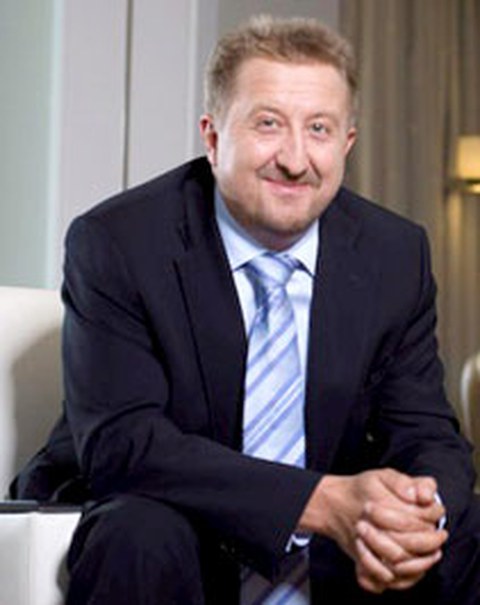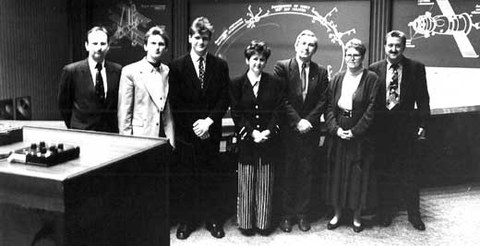Co-initiator of the alumni ball
(Interviewed in 2011)
Dagmar Möbius
Andreas Mönch was born in Berlin to a family of artists. His path to university and his current profession was anything but straightforward.

Andreas Mönch
His first commercial premises were actually at TU Dresden , and he ran his first career fair at a student club. Today, Andreas Mönch sits on the board of Saxonia Systems AG, the main sponsor of the alumni ball.
His early passion was for the humanities: history, archaeology, literature, and philosophy. He was influenced by his artistic parents – his mother was a classical singer and his father a script editor.
"It wasn’t a particularly tech-savvy house," jokes Andreas Mönch. When it came to further study after 8th grade and there were only two places in each class for the "Abitur" – the school-leaving and university-entrance qualification – Mönch realized that he had "let [himself] down a bit in the year that really mattered." The two places were allocated to other students. Fair or not – Andreas Mönch opted for a three-year program comprising vocational training and a school-leaving qualification. In 1977, he applied for a job in the popular new field of electronics with the Werk für Fernsehelektronik, or "Facility for TV electronics," in his native Berlin. Without much previous training. "A year after starting my training, I had reached the point where I could more or less keep up with the many dedicated electronics enthusiasts and math and physics geeks in my class," he recounts with a grin. His interest in the subject grew, and he spent a lot of time designing and building electronic components. "There was a particular demand for my lighting effects units and chaser controls for discos, which came with a whole range of different programs," he recalls.
With his qualification, applying to a traditional university was out of the question. Andreas Mönch instead opted for the Ingenieurhochschule Dresden, which at that time was one of the leading institutions in the field of information technology and computer science. Dresden's huge student club scene and the vibrant student life in the city were also appealing to him. Not to mention the cultural scene, the architecture, and the surrounding countryside. He began his studies in information technology in Dresden in 1984. "I even put up with the major drawback of not being able to receive West German television here in the valley," he laughs. In 1986, the Ingenieurhochschule Dresden merged with TU Dresden. Standards at both institutions were incredibly high.
"In first year at the Ingenieurhochschule in particular, math was a major hurdle at which many students fell. In the first two semesters, we had to take three special exams with the innocuous-sounding title 'math certificates.'" Like many of his fellow students, Andreas Mönch initially wondered what he had been awarded his school math qualification for. Tasks included deriving formulas from "Bronstein" (the Handbook of Mathematics) at record speed without any tools and in an extremely narrow time frame. "There were only two possible grades for each of those exams: a top grade or fail." Students who achieved 92 percent passed, everyone else had to repeat the exam. And if you failed the dreaded oral examination, your studies were over. That was not an option for Andreas Mönch. He studied so hard with his fellow students that he passed all the exams on the first attempt. Mönch believes "that was a time in which most of us learned what it means to prioritize."

A visit to the first foreign customer at the Russian Space Control Center near Moscow in 1994. The organization then known as the Saxonia Bildungsinstitut ran management training courses in Dresden for all personnel managers in the Russian space industry.
Things were no less strict at TUD. Looking back on challenges like field theory, he bemoans, "At the time, I found knockout hurdles like that in my 8th semester pretty unfair."
From the time he graduated until September 1991, Andreas Mönch worked as a research associate at the Faculty of Computer Science. In retrospect, his three years as a "junior" higher education lecturer were a factor in his later business success. It was while studying that he first became interested in "establishing something as [his] own boss, but setting up an engineering firm in the GDR was quite simply forbidden." When circumstances permitted, he immediately began looking for viable business segments. Mönch laid the groundwork for an IT company in May 1990, working alongside his full-time job in partnership with two former fellow students. "That was the basis for what is now Saxonia Systems AG." Mönch's first forays into business began in Room 148, Hans-Grundig-Straße 25 – thanks to the support of his final-year dissertation supervisor, Dr. Dietmar Klimant, and with the kind permission of the Dean, Professor Helmut Adler. "I am still very grateful today for their help," stresses Mönch, who is now 50.
He believes that without the technical and methodological grounding he gained during his studies, he would not have been able to found or manage a company in this field. Although he did run into his share of problems: "Things didn't really work out with the IT company at first." The second area of business, training courses for adults, on the other hand, grew immensely. From late 1992 on, Mönch and his new business partner Viola Klein established the successful "Saxonia Bildungsinstitut," specializing in professional development for academics. He tried the IT systems vendor route again with Saxonia Systeme GmbH, now Saxonia Systems AG, in late 1994.
The company's main focuses are currently software development and IT process consultancy. Since 2008, the Saxonia Systems AG headquarters have been right next to campus in what used to be the Südvorstadt district local authority office, now renovated and fitted with state-of-the-art equipment.
The company's ties with TUD, and in particular the Faculty of Computer Science, have traditionally been very close. Not only chairman and managing director Andreas Mönch, but also the other director on the Saxonia Systems AG board, Botho Kohn, and two of the five divisional managers all studied at TU Dresden. There are an exceptionally large number of TUD graduates among the 180 employees. Mönch sees the fact that TUD is Germany's largest technical university as a major locational advantage for his company. "However, the level at the other universities, universities of applied science and universities of cooperative education in Saxony is also very high in this field," he believes. He has found his dream job. And this despite the fact that his "choice of subject was initially not entirely voluntary."
